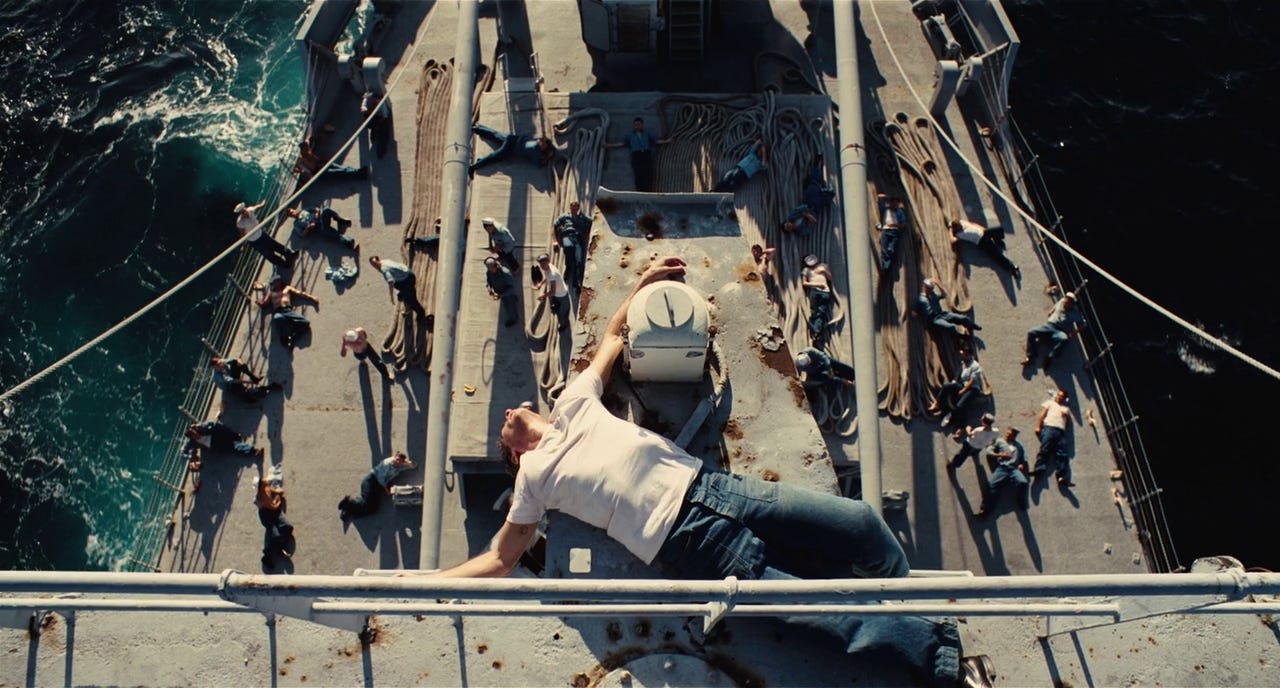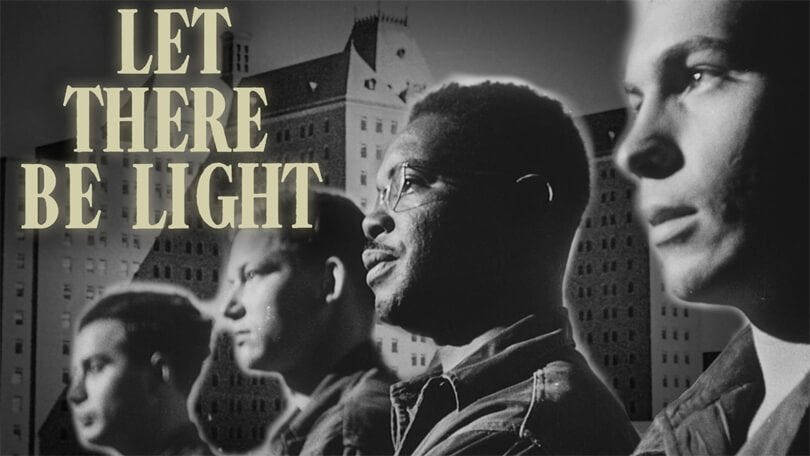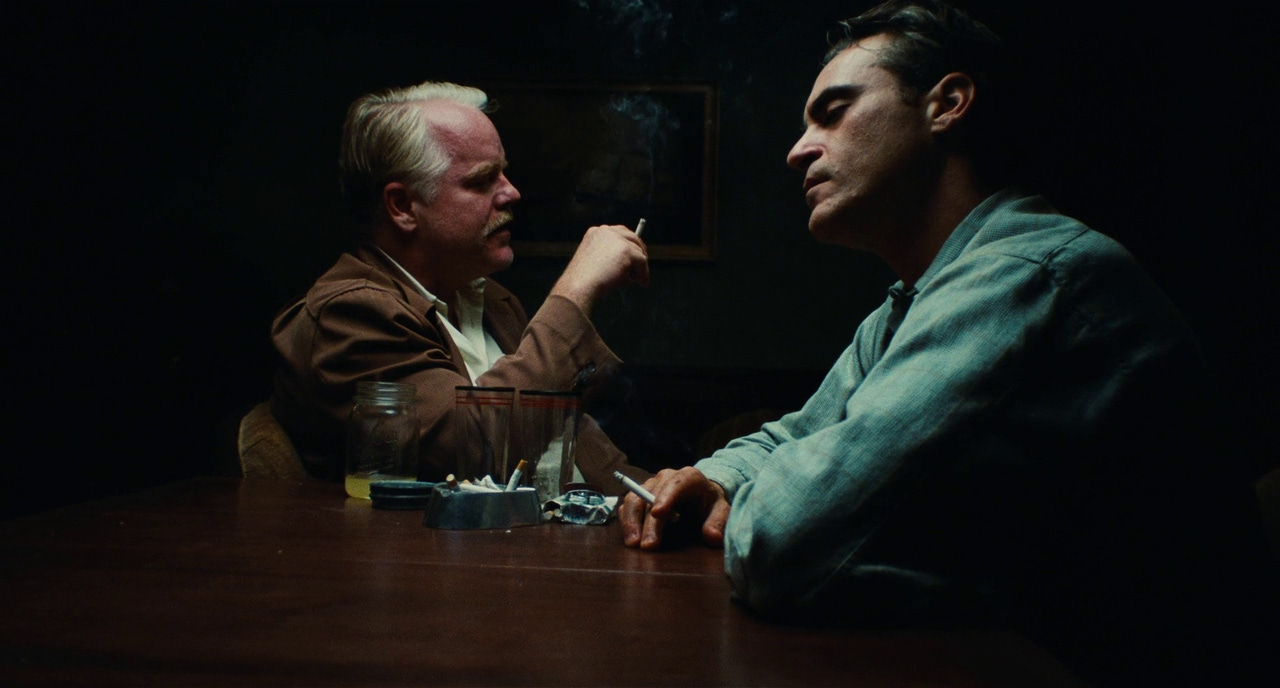"The Master" (2012)
synopsis and analysis of Paul Thomas Anderson's 2012 film "The Master"
“The Master” (2012) is a compassionate look at Freddie Quell, an ostracized World War II naval veteran who can’t find his place in a post-war world. A significant source of inspiration for Paul Thomas Anderson in making this film is the documentary, “Let There Be Light.” In 1946, the documentary was intended to be an educational film about post-traumatic stress disorder. Instead, the film’s brutally honest portrayal of PTSD showed that rehabilitating some soldiers would be nearly impossible.
"Twenty percent of our army casualties," the narrator says, "suffered psychoneurotic symptoms: a sense of impending disaster, hopelessness, fear, and isolation."
The U.S. Army banned it for 35 years. In his memoir “An Open Book,” director John Huston claimed that the military refused to show his documentary to keep the "warrior" myth alive. The myth that American soldiers’ spirits remained unbroken despite enduring something so traumatic as World War II. Men, especially soldiers, can be hesitant to be vulnerable. Instead, they bottle up the trauma until it releases in often violent ways.
Anderson quotes, “Let There Be Light,” when Freddie is questioned about his crying spells in the Navy.
“It was brought on by a letter from a girl I knew. It was, what I believe, in your profession, you call nostalgia.”
The documentary's point was that businesses should not hesitate to hire shell-shocked veterans. But if you watch “There Will Be Light,” it's hauntingly apparent that some of these men could never work typical jobs again.
Not only was there lingering trauma from the war. These guys needed a master or a commander that you respected and looked up to. The rigid schedule and hierarchy of the military provided these men comfort and stability.
Freddie’s first job is photographing something he’s never had: happy children and loving families. Freddie was having sex at work and making liquor from photo-developing chemicals. This is the first time we see Freddie happy. He was drinking and hooking up with a model. He asks her out on a date but ends up crashing asleep at dinner, blowing his chance with the model. Freddie returns and takes out his anger on an innocent man trying to get his portrait taken for his wife. This erratic behavior eventually boils into a fight, leading to Freddie losing his job.
Freddie finds a second job on a farm where he concocts his toxic elixir again. He shares his drink with a random coworker this time, who soon keels over and dies. The other coworkers accuse Freddie of poisoning him and run him out of town. Freddie then wanders the streets at night, looking for somewhere to hide after killing a man. He sneaks onto a boat party where Lancaster Dodd embraces him with loving arms.
Dodd is the founder of “The Cause,” a cult-like movement. When Freddie asked, “What do you do ?” Dodd replied, “I am a writer, a doctor, a nuclear physicist, and a theoretical philosopher. But above all, I am a man, a hopelessly inquisitive man, just like you.”
The Cause taught Dianetics using a hypnotic therapy that Dodd claims could cure anything from allergies to Leukemia by processing trauma from past lives and correcting them to their “inherent state of perfect.”
Lancaster Dodd offers Freddie Quell spiritual rehabilitation by processing his grief one-on-one. The technique used by Dodd is having Freddie answer rapid-fire questions about his trauma without blinking. This breaks Freddie down.
On the surface level, Freddie is traumatized by the war. However, it goes much deeper than that. Freddie’s father died of alcohol poisoning, and his mother was institutionalized for mental issues. What Freddie regrets the most is abandoning Doris. No amount of military therapy ever got Freddie to open up like this. Dodd uncovered the sweetness of Freddie. The Freddie that yearns for the love of Doris. After an intense, transcendental processing session, Freddie awakens from his trance-like state to Lancaster’s approval as he tells Freddie,
“You are the bravest boy I’ve ever met.”
Lancaster becomes infatuated with Freddie. They smoke Cools cigarettes and drink Freddie’s paint-thinner elixir. They form an unusual bond. Lancaster Dodd is stoic and academic, while Freddie is vulgar and untamed. Their contrasting personalities balanced each other. They repeatedly wondered where they first met because they were so comfortable with each other.
As the film continues, you see them taking on each other's characteristics. Freddie becomes more gentle and obedient. At the same time, Lancaster becomes more rageful and irritable. When questioned, Dodd bursts out in rage. “If you know the answer to your question, then why ask pig fuck!” Dodd has the same animal-like tendencies that Freddie shows; he’s better at hiding it.
Later Freddie wonders why Dodd’s son Val Dodd isn’t joining the rest of the group, saying, “You could learn something.” Val responds to Freddie,
“he’s making it up as he goes along.”
Police soon arrive at the home to arrest Dodd for operating without a medical license. Freddie has an animalistic outburst watching Dodd being detained, flailing around the porch as Dodd tells Freddie to calm down. This results in Freddie also being charged. While Freddie and Lancaster Dodd are in jail, Freddie has another outburst. He bangs his head against the cell’s bed and destroys the toilet.
Freddie repeats what he heard from Val, accusing Lancaster Dodd of making everything up. Dodd tells Freddie that he is the only person who likes him. After their release, other members question Freddie’s commitment to The Cause. After this, Freddie’s processing becomes more tedious and exhausting. They were draining him mentally and physically.
In a processing exercise, Clark repeatedly yells “Doris” at Freddie, knowing it would upset him. Peggy reads pornographic novels to him in a graphic way. In an attempt to desensitize Freddie, they made him crazier, and they knew it. They were punishing him for being a scoundrel.
The Cause later announces they will go to Phoenix, Arizona, to launch Dodd’s second book, “The Split Saber.”
The title of The Master has a lot of meaning behind it. Dodd trains Freddie like a dog. Dodd is Freddie’s master. There is one moment when Freddie feels liberated from his master. Dodd allows Freddie to drive the motorcycle in the Arizona desert for fun. But Freddie decides to escape. You can see Dodd get anxious. Just like letting your dog run around without a leash. Will he love me enough to come back? Did I abuse my power as the master too much, and now he has run away?
As Freddie leaves on the motorcycle, one thing is on his mind, Doris. When Freddie returns to her childhood home, he discovers she is married and has moved to Alabama. The memories of Doris are all Freddie will ever have of her. Before joining The Cause, Freddie may have done something drastic learning this news. But now Freddie accepts that he broke the promise to Doris and can move on. He is polite and gracious to Doris’ mother. He returns to see Lancaster Dodd one last time.
The last scene Lancaster and Freddie spend together is a gentle and loving connection. Dodd accepts that the animal he first learned to tame wants to leave. Freddie no longer needs the direction of Dodd; he is his own master. Dodd is envious of Freddie and asks,
"If you figure a way to live without serving a master, any master, then let the rest of us know, will you? For you'd be the first person in the history of the world."
Freddie may have reached enlightenment by shedding the leash of his master. But he’ll never experience love like he did with Lancaster Dodd. Together they shared an insatiable bond that can only be filled by each other; they were soulmates.
Freddie returns home and quickly gets in bed with another woman. This time during sex, Freddie begins jokingly imitating the processing session by telling the woman not to blink and answer questions flirtatiously as they lie together in bed naked.
Freddie was a broken outcast, but through his relationship with Dodd, he processed his trauma and grief to accept his life. You can’t change the past, no matter how hard you try. No matter how much processing is done with Dodd, it’ll never bring back Doris. Similar to how we adapt, learn, and grow from every relationship. But you need to find one in your life as rich as the one between Freddie Quell and Lancaster Dodd—romantically or platonically.
This makes the final song so melancholic with the lyrics sung by Helen Forrest,
We were waltzing together to a dreamy melody
When they called out “change partners.”
And you waltzed away from me.
Now my arms feel so empty as I gaze around the floor
And I’ll keep on changing partners
Till I hold you once more







